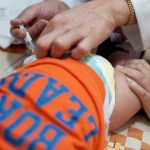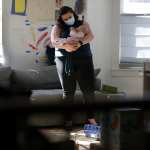For Megan H. Pesch, doing everything possible to ensure the health of her third baby became a bit of an obsession.
While pregnant, Pesch exercised, avoided changing her cat’s litter and put off getting highlights in her hair, just in case the chemicals could have any effects. She even washed her hair with baking soda during the first trimester — though she is quick to admit this is not an evidence-based recommendation.
As a developmental and behavioral pediatrician with the University of Michigan at Ann Arbor, Pesch was better positioned than most people to understand the precautions she needed to take.
So she was shocked when her baby Odessa had completely lost her hearing by the time she was 2 1/2 months old. After weeks of tests and uncertainty, Pesch and her husband learned that Odessa’s hearing loss was caused by congenital cytomegalovirus, also known as congenital CMV. It is an infection Pesch knew about but had never received detailed education or guidance on as a medical professional or an expectant mother.
“Even throughout my medical training, I never learned about what to do to protect myself or reduce my risk,” said Pesch, who has since focused her research on CMV and is on the board of the National CMV Foundation. “I went back to my notes from my medical residency’s board review. There were two slides on congenital CMV, and they mentioned nothing about prevention.”
Pesch’s feeling of being blindsided by her child’s risk to congenital CMV is common, though the virus itself isn’t rare. Cytomegalovirus is a prevalent, cold-like pathogen passed through bodily fluids like saliva, urine and breast milk. It is one of the leading causes of congenital hearing loss and neurodevelopmental disabilities in children, yet less than a quarter of women have heard of it. The risk can be mitigated by parents washing their hands and not sharing food with older children, however doctors often do not counsel about these practices in connection with CMV. CMV detection is also not part of the routine newborn screening, though babies can also have their urine, blood or saliva tested in the first two or three weeks after birth.
June is National CMV Awareness Month, and parents like Pesch told The 19th they believe there needs to be better education and support for pregnant people and families whose children are affected by the virus.
Nearly 1 in 3 U.S. children are infected with CMV by age 5, and more than half of adults have been infected by age 40, according to the Centers for Disease Control and Prevention. Once someone has the virus, it remains in their system forever and can go dormant for stretches of time, but most people who contract the virus over the course of their life will not experience any negative health effects.
The primary cause for concern with CMV centers on pregnant people and developing fetuses. If a person either contracts CMV or already has the virus dormant in their system when they become pregnant, it could pass through the placenta and affect a baby’s physical and mental development. Congenital CMV is rarely life threatening for babies but can result in hearing and vision loss, cognitive disabilities or microcephaly, a condition where a baby has a smaller head than expected.
“When the CMV is passed through the placenta, it can invade the growing fetal brain cells. We don’t see that in CMV in any other situation,” Pesch said. She added that in utero, the virus can also cause inflammation to the placenta, which can obstruct the blood flow and nutrients fetuses receive.
The risk of congenital CMV is higher for when the pregnant person already has a child, who can expose the parent after contracting it at daycare or school. Other people who spend a lot of time with children, such as day care workers and health care workers, could also face higher chances of exposure to CMV.
About 30 percent of pregnant people with CMV will pass it through the placenta. Of the babies born with congenital CMV, about twenty percent will experience symptoms or long-term effects. Babies born with congenital CMV can exhibit signs at birth, or they can develop them later if not diagnosed and treated early. Others will remain asymptomatic. Research also suggests that Black infants experience much higher infection rates of congenital CMV than White, Latinx and Asian babies.
Mari Carmen Aguilar, 36, had never heard of CMV prior to her first born, Benjamin, being diagnosed with the virus. At the time Aguilar lived in Dickinson, North Dakota, a city of about 26,000 people.
Benjamin’s diagnosis with microcephaly triggered a series of tests that ultimately led to identifying a CMV infection. In addition to microcephaly, Benjamin is also legally blind and experienced hearing loss, among health conditions. As Aguilar began to learn more about CMV, she grew frustrated that she was never told about it during her pregnancy.
“They never told me. Doctors never told me, so I was mad,” Aguilar said. “I’m happy with my son, I’m happy with my life, but I wish someone would have told me that I have this so that I could have helped him a little bit during my pregnancy.”
Two other mothers told The 19th they had never heard of CMV prior to their child’s diagnosis with the virus. Guidance from medical associations may play one role in this. A 2015 bulletin from the American College of Obstetricians and Gynecologists that includes the most recent clinical management guidelines for OB-GYNs says preventative education for parents on congenital CMV “may be difficult to implement because they are often considered impractical or burdensome.”
This includes recommendations that pregnant people practice rigorous hand washing after handling their children’s diapers. They can also reduce contact with their child’s saliva by avoiding things like sharing utensils or food with their other small children. ACOG does briefly mention a few prevention methods for congenital CMV on its website.
When asked about the organization’s guidance, a spokesperson with ACOG said it “does not recommend against OB-GYNS discussing CMV with their patients, but there is currently not enough quality data to support making an official recommendation on counseling or screening.” In other words, it is unclear how effective these precautions are at preventing a parent from getting CMV.
But mothers told The 19th that omitting any information about the virus during their pregnancies hurts their ability to take steps to avoid contracting it. “It feels like a very paternalistic view of how they care for their patients,” said Samantha Nikirk, 34, whose 22-month-old daughter Evie was diagnosed with congenital CMV. “Just because you can’t completely control the situation doesn’t mean that parents don’t have the right to know about it.”
Pesch said routine CMV screenings should be incorporated into infant care, even for those who do not show symptoms right away. An early diagnosis can give a family time to provide their child with antiviral medication that may help mitigate any potential effects of the virus. Currently, there is no vaccine to prevent congenital CMV.
Robin Tevlin and her husband dealt with months of tests for their son Ben to figure out the source of his hearing loss. “When you have your local ENT and your pediatrician, the people that you’ve trusted, not talking about CMV, you result to looking online and playing doctor yourself,” she said. “You go down this rabbit hole of just so many unknowns; it was very nerve-wracking to try to wait for answers.”
They stumbled across information about CMV in their own research. When the doctor they were seeing at the time assured them CMV was not a concern, they sought a second opinion with Pesch at the University of Michigan. More tests confirmed Ben had congenital CMV.
In many ways, the CMV diagnosis was the first hurdle as Tevlin, Aguilar and their families worked to understand the virus and their child’s resulting long-term care needs. That care can be difficult to find: Aguilar and her husband moved with Benjamin 1,446 miles from North Dakota to Phoenix to be closer to the doctors he needs.
Tevlin makes the two-and-a-half-hour drive about twice a month from their home in Grand Rapids, Michigan, to the University of Michigan in Ann Arbor for Ben’s treatments. She said she was excited Ben would receive his first cochlear implant next month.
Such measures are not feasible for every family, and the women said they hope that by sharing their stories, more pregnant people will receive the guidance and support they need.







